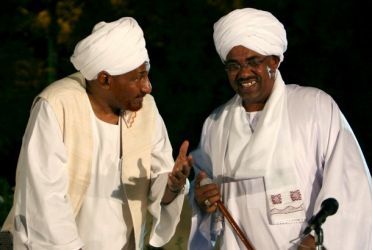Skepticism high over al-Mahdi’s NUP call for sit-in
June 27, 2013, (KHARTOUM) – A senior opposition figure on Thursday expressed doubts about the call by the National Umma Party (NUP) for a sit-in this weekend saying that the party’s chief al-Sadiq al-Mahdi has a history of undermining any efforts aimed at toppling the regime dominated by the National Congress Party (NCP).

Al-Mahdi and other NUP leaders are set to fly in to Khartoum from Cairo on Friday where he was visiting.
This Sunday will mark 24 years since the 1989 military coup against the multi-party government led by al-Mahdi.
But the opposition figure, who asked not to be named, downplayed the announcement stressing that the NUP leader’s past proves that he wants to breathe life into the NCP-led government of president Omer Hassan al-Bashir.
“We do not trust this man; he steals our plans to make it fail and add few more years to the ruling regime plus he is not in good terms with the [Sudan] Revolutionary Front as he fiercely criticized it during the Abu-Kershola events,” he told Sudan Tribune.
A columnist in the privately owned al-Khartoum newspaper echoed the same sentiments in an op-ed.
“Let us see what al-Mahdi intends to do in the last day of this month, but what this man did in many past initiatives makes us totally non-optimistic [because] he is not someone to be trusted,” Hassan Ismail wrote.
“In the last [2010 general] elections he [al-Mahdi] received millions of pounds from the ruling [NCP] party,” he added.
But an NUP official dismissed the skepticism and expressed optimism about the upcoming mobilization campaign starting this weekend.
“We have thousands of members from the party’s base who are looking forward to the change campaign. They are tired of war and the economic conditions and it is not useful to wait too long because the situation has become very critical,” the NUP communication committee officer Abdel-Jalil al-Basha said.
The ruling NCP organization bureau secretary Adil Suleiman told al-Sahafa newspaper that the government does not feel threatened by the NUP plans saying that the opposition has no presence in the streets and will fail to bring about an “Arab Spring”.
Many critics point out to the fact that al-Mahdi’s son Abdel-Rahman has accepted a position as an assistant to president Bashir in late 2012.
They also say that al-Mahdi, who was also Sudan’s last democratically elected Prime Minister before the 1989 coup, has made it a habit to publicly bash other opposition parties and insisting that he does not want to overthrow the regime but rather “change” it.
The NUP leader has made sure to distance his party from last year’s demonstrations that broke out in response to the government’s rollout of austerity measures in response to growing economic pressures caused by the secession of the oil-rich South Sudan.
“We have hosted them [the protesters in our headquarters] but we don’t think that the time has come for us to organise such a movement until we have an alternative regime in place … and democratic transformation,” al-Mahdi, told the Financial Times newspaper in July 2012.
Some members of the NUP politburo privately say that they believe al-Mahdi has forged a secret deal with the NCP to assure that the opposition party stays away from any attempts to stage mass protests against the regime.
This month al-Mahdi said he does not approve of the 100-day plan to oust the regime announced by the National Consensus Front (NCF) even though a representative of the NUP at the coalition said he took part in formulating the scheme.
Instead he offered a different initiative to change the regime through collecting a million signatures and organizing sit-ins in public squares and other places.
(ST)

